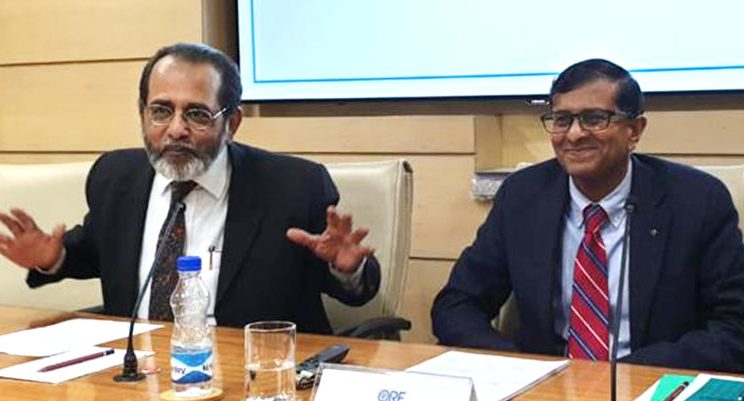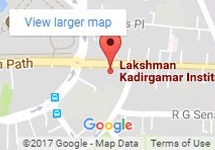
Reading Time: 2 min read
Dr. Ganeshan Wignaraja, Executive Director at the Lakshman Kadirgamar Institute of International Relations and Strategic Studies (LKI), was recently invited to speak at the Observer Research Foundation (ORF) in New Delhi. The talk titled ‘Is the Indian Ocean economy a new global growth pole?,’ was based on LKI’s recently published Working Paper.
Dr. Wignaraja’s presentation focused on the region’s initial conditions, recent trade-led growth, and it portrayed the near and medium context and various policy challenges. He also looked at Sri Lanka’s positioning as a trading hub through port investments and economic reforms amidst challenging geopolitical circumstances. His presentation was followed by a Q&A session, moderated by Amb. Rakesh Sood, Distinguished Fellow, Observer Research Foundation. The wide-ranging discussion brought together a diverse audience of reputed academic experts and other policymakers from India, and highlighted several interesting issues.
- Growth in the rapidly growing Indian Ocean appears to be hindered by a number of factors such as barriers in trade and investment and the quality of ports.
- Hambantota has started to function as a working seaport, even if in the limited capacity of small amounts of transhipment cargo. It is in the early stages but it will gradually develop. The game changer will be the industrial zone, not necessarily the port itself.
- Trade reforms in Sri Lanka and India should be tailored to national circumstances and accompanied by retraining workers in losing sectors and better financial access for SMEs.
- India is more complementary than competition for Sri Lanka in the maritime domain. Sri Lanka may have an advantage in terms of transshipment for now but that remains in the low value-addition domain. Meanwhile, India has a market in excess of 1 billion people and a reasonable manufacturing sector. India and Sri Lanka therefore, should not perceive each other as threats but collaborate.
- In the current context, the United Nations Convention on the Law of the Sea (UNCLOS) seems inadequate to deal with growing non-traditional maritime challenges in the Indian Ocean such as piracy, drugs and illegal fishing. It must be updated. The application of soft law in the current geopolitical climate, rather than hard law, could yield benefits for all Indian Ocean economies and major maritime users.
- Dr. Wignaraja also spoke at a session titled ‘Governing New Challenges: Inclusive Development, Trade, and Finance’ at the 4th South Asian Network on Economic Modeling (SANEM) Annual Economists’ Conference 2019 held on 16-17 February 2019 in Dhaka.
The ORF is one of India’s leading independent think tank. The foundation has three centres in Mumbai, Chennai and Kolkata, and provides informed and viable inputs for policy and decision-makers in the Indian Government and to the political and business leaders of India.



